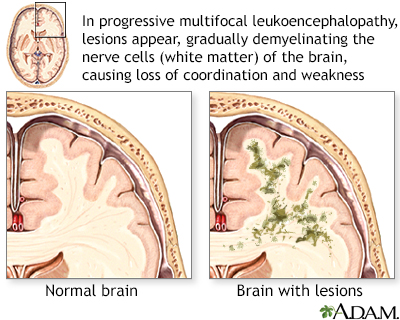Progressive Multifocal Leukoencephalopathy (PML)

Progressive Multifocal Leukoencephalopathy (PML): Overview, Causes, Symptoms, Diagnosis, and Treatment
Progressive multifocal leukoencephalopathy (PML) is a rare and often fatal viral disease caused by the JC virus (JCV), which affects the white matter of the brain by destroying the myelin sheath surrounding nerve cells. It primarily occurs in individuals with weakened immune systems. Below is a detailed overview of PML, including its causes, symptoms, diagnosis, and treatment options.
Causes of PML
JC Virus (JCV):
- Prevalence: Up to 85% of adults have been infected with JCV, but it remains dormant in most people.
- Reactivation: Occurs in individuals with compromised immune systems, such as those with HIV/AIDS, cancer, or undergoing immunosuppressive therapy.
Immune System Suppression:
- HIV/AIDS: PML is an AIDS-defining illness and was more common before the advent of effective antiretroviral therapy (ART).
- Immunosuppressive Medications: Used for conditions like multiple sclerosis, rheumatoid arthritis, or organ transplantation.
- Cancer: Particularly hematological malignancies like leukemia and lymphoma.
Symptoms of PML
- Clumsiness and Lack of Coordination: Early signs due to brain involvement.
- Progressive Weakness: In the arms and legs, worsening over time.
- Vision Problems: Including blurred vision or blindness.
- Speech Difficulties: Aphasia or other language impairments.
- Memory Loss and Cognitive Decline: As the disease progresses.
- Personality Changes: Mood swings or altered behavior.
- Seizures and Ataxia: Less common but possible symptoms.
Diagnosis of PML
- Clinical Presentation: Symptoms and medical history are crucial for initial suspicion.
- Imaging Studies: MRI scans show characteristic white matter lesions in the brain.
- Cerebrospinal Fluid (CSF) Analysis: Detection of JC virus DNA in CSF confirms the diagnosis.
- Brain Biopsy: Rarely performed but can provide definitive diagnosis.
Treatment and Management
Restoring Immune Function:
- Antiretroviral Therapy (ART): For HIV-related PML, ART can improve immune function and slow disease progression.
- Plasma Exchange: Removes immunosuppressive drugs from the blood to enhance immune response.
Experimental Treatments:
- New drugs are being investigated but have not yet proven effective without significant toxicity.
- Participation in clinical trials may offer access to emerging therapies.
Prognosis and Outlook
- Mortality Rate: High, with up to 50% mortality within the first few months after diagnosis.
- Survival and Disability: Those who survive often experience severe neurological disabilities.
- Dependence on Underlying Condition: Prognosis varies based on the severity of the underlying immune deficiency and response to treatment.
Conclusion
PML is a serious condition with limited treatment options, primarily managed by restoring immune function. Early diagnosis and intervention are critical to improve outcomes, though the prognosis remains challenging due to the disease’s aggressive nature.
Consult with Our Team of Experts Now!
At DrStemCellsThailand (DRSCT)‘s Anti-Aging and Regenerative Medicine Center of Thailand, we emphasize comprehensive evaluations and personalized treatment plans of Cellular Therapy and Stem Cells for managing various health conditions. If you have questions about Progressive Multifocal Leukoencephalopathy (PML) or would like more information on our services, consult with our experts today!















